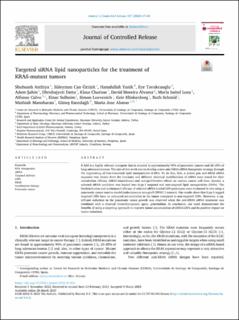| dc.contributor.author | Anthiya, Shubaash | |
| dc.contributor.author | Oztürk, Süleyman Can | |
| dc.contributor.author | Yanik, Hamdullah | |
| dc.contributor.author | Tavukcuoglu, Ece | |
| dc.contributor.author | Sahin, Adem | |
| dc.contributor.author | Datta, Dhrubajyoti | |
| dc.contributor.author | Charisse, Klaus | |
| dc.contributor.author | Álvarez, David Moreira | |
| dc.contributor.author | Loza, María Isabel | |
| dc.contributor.author | Calvo, Alfonso | |
| dc.contributor.author | Sulheim, Einar | |
| dc.contributor.author | Loevenich, Simon | |
| dc.contributor.author | Klinkenberg, Geir | |
| dc.contributor.author | Schmid, Ruth Baumberger | |
| dc.contributor.author | Manoharan, Muthiah | |
| dc.contributor.author | Esendağlı, Güneş | |
| dc.contributor.author | Jose Alonso, Maria | |
| dc.date.accessioned | 2024-04-10T10:52:21Z | |
| dc.date.available | 2024-04-10T10:52:21Z | |
| dc.date.created | 2023-05-13T09:58:59Z | |
| dc.date.issued | 2023 | |
| dc.identifier.citation | Journal of Controlled Release. 2023, 357, 67-83. | en_US |
| dc.identifier.issn | 0168-3659 | |
| dc.identifier.uri | https://hdl.handle.net/11250/3125776 | |
| dc.description.abstract | K-RAS is a highly relevant oncogene that is mutated in approximately 90% of pancreatic cancers and 20–25% of lung adenocarcinomas. The aim of this work was to develop a new anti-KRAS siRNA therapeutic strategy through the engineering of functionalized lipid nanoparticles (LNPs). To do this, first, a potent pan anti-KRAS siRNA sequence was chosen from the literature and different chemical modifications of siRNA were tested for their transfection efficacy (KRAS knockdown) and anti-proliferative effects on various cancer cell lines. Second, a selected siRNA candidate was loaded into tLyp-1 targeted and non-targeted lipid nanoparticles (LNPs). The biodistribution and antitumoral efficacy of selected siRNA-loaded LNP-prototypes were evaluated in vivo using a pancreatic cancer murine model (subcutaneous xenograft CFPAC-1 tumors). Our results show that tLyp-1-tagged targeted LNPs have an enhanced accumulation in the tumor compared to non-targeted LNPs. Moreover, a significant reduction in the pancreatic tumor growth was observed when the anti-KRAS siRNA treatment was combined with a classical chemotherapeutic agent, gemcitabine. In conclusion, our work demonstrates the benefits of using a targeting approach to improve tumor accumulation of siRNA-LNPs and its positive impact on tumor reduction. | en_US |
| dc.language.iso | eng | en_US |
| dc.publisher | Elsevier | en_US |
| dc.rights | Attribution-NonCommercial-NoDerivatives 4.0 Internasjonal | * |
| dc.rights.uri | http://creativecommons.org/licenses/by-nc-nd/4.0/deed.no | * |
| dc.title | Targeted siRNA lipid nanoparticles for the treatment of KRAS-mutant tumors | en_US |
| dc.title.alternative | Targeted siRNA lipid nanoparticles for the treatment of KRAS-mutant tumors | en_US |
| dc.type | Peer reviewed | en_US |
| dc.type | Journal article | en_US |
| dc.description.version | publishedVersion | en_US |
| dc.rights.holder | © 2023 The Authors. Published by Elsevier. | en_US |
| dc.source.pagenumber | 67-83 | en_US |
| dc.source.volume | 357 | en_US |
| dc.source.journal | Journal of Controlled Release | en_US |
| dc.identifier.doi | 10.1016/j.jconrel.2023.03.016 | |
| dc.identifier.cristin | 2147275 | |
| cristin.ispublished | true | |
| cristin.fulltext | original | |
| cristin.qualitycode | 2 | |

